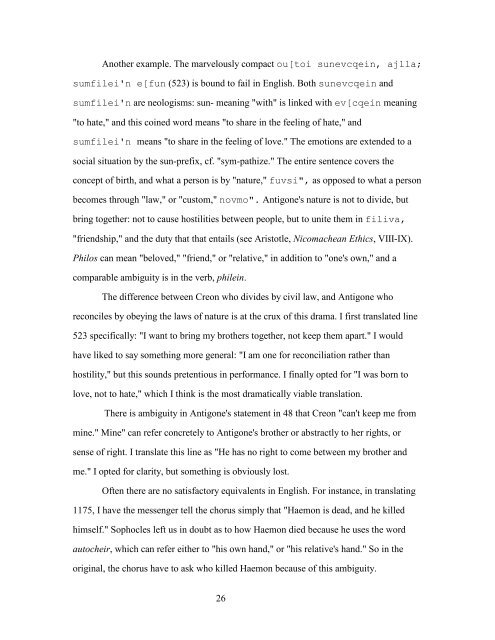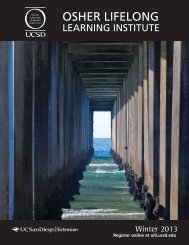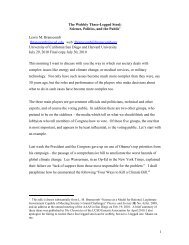1 Sophocles' Antigone Introduction, translation, and notes by ...
1 Sophocles' Antigone Introduction, translation, and notes by ...
1 Sophocles' Antigone Introduction, translation, and notes by ...
You also want an ePaper? Increase the reach of your titles
YUMPU automatically turns print PDFs into web optimized ePapers that Google loves.
Another example. The marvelously compact ou[toi sunevcqein, ajlla;<br />
sumfilei'n e[fun (523) is bound to fail in English. Both sunevcqein <strong>and</strong><br />
sumfilei'n are neologisms: sun- meaning "with" is linked with ev[cqein meaning<br />
"to hate," <strong>and</strong> this coined word means "to share in the feeling of hate," <strong>and</strong><br />
sumfilei'n means "to share in the feeling of love." The emotions are extended to a<br />
social situation <strong>by</strong> the sun-prefix, cf. "sym-pathize." The entire sentence covers the<br />
concept of birth, <strong>and</strong> what a person is <strong>by</strong> "nature," fuvsi", as opposed to what a person<br />
becomes through "law," or "custom," novmo". <strong>Antigone</strong>'s nature is not to divide, but<br />
bring together: not to cause hostilities between people, but to unite them in filiva,<br />
"friendship," <strong>and</strong> the duty that that entails (see Aristotle, Nicomachean Ethics, VIII-IX).<br />
Philos can mean "beloved," "friend," or "relative," in addition to "one's own," <strong>and</strong> a<br />
comparable ambiguity is in the verb, philein.<br />
The difference between Creon who divides <strong>by</strong> civil law, <strong>and</strong> <strong>Antigone</strong> who<br />
reconciles <strong>by</strong> obeying the laws of nature is at the crux of this drama. I first translated line<br />
523 specifically: "I want to bring my brothers together, not keep them apart." I would<br />
have liked to say something more general: "I am one for reconciliation rather than<br />
hostility," but this sounds pretentious in performance. I finally opted for "I was born to<br />
love, not to hate," which I think is the most dramatically viable <strong>translation</strong>.<br />
There is ambiguity in <strong>Antigone</strong>'s statement in 48 that Creon "can't keep me from<br />
mine." Mine" can refer concretely to <strong>Antigone</strong>'s brother or abstractly to her rights, or<br />
sense of right. I translate this line as "He has no right to come between my brother <strong>and</strong><br />
me." I opted for clarity, but something is obviously lost.<br />
Often there are no satisfactory equivalents in English. For instance, in translating<br />
1175, I have the messenger tell the chorus simply that "Haemon is dead, <strong>and</strong> he killed<br />
himself." Sophocles left us in doubt as to how Haemon died because he uses the word<br />
autocheir, which can refer either to "his own h<strong>and</strong>," or "his relative's h<strong>and</strong>." So in the<br />
original, the chorus have to ask who killed Haemon because of this ambiguity.<br />
26









